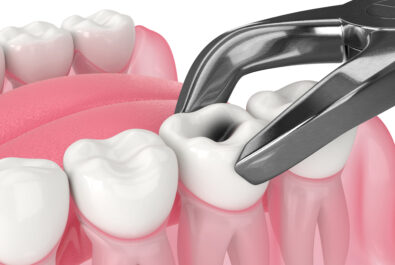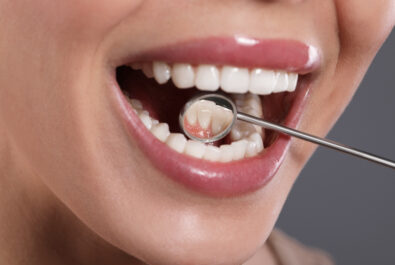Your jaw bone is responsible for supporting the teeth, aiding in chewing and speaking, and filling out the normal proportions of your face. If the jaw loses mass or density to resorption (a phenomenon where bone cells break down and are absorbed into the body via the blood) or as the result of a traumatic injury, then you might find yourself having difficulty performing everyday tasks normally. Today, we’re looking at why you might need a bone graft and taking a nuts-and-bolts tour of the procedure. (more…)
Bad Teeth, Lost Teeth, New Teeth, False Teeth: A Look at Dental Implant Restorations
As we’ve learned in our in-depth examination of missing teeth, a number of risk factors – both within and outside of your control – can make you more susceptible to the primary causes of tooth loss. So, if gum disease, decay, or an accident claim one or more of your permanent teeth, what’s your next step? In the past, patients could choose from dental bridges, partial dentures, and full dentures. These days, dental implants are used to provide a longer lasting, more stable anchor for artificial teeth. Today, we’re looking at the two most common dental prosthetics, or replacement teeth, that your dentist might use to restore your smile. (more…)
Are You Unknowingly on the Tooth Loss Fast Track?
In our ongoing exploration of the causes and consequences of tooth loss, we’ve looked at the detrimental effect missing teeth can have on your oral and overall health. We’ve also discussed risk factors for adult tooth loss that you can control through at-home hygiene and lifestyle modification. Today, we’re delving into risk factors for tooth loss that might be beyond your control and offering a few easy-to-follow tips for maintaining a high level of oral health despite the odds. (more…)
Can You Keep Your Teeth for Life?
In our last post, we discussed the three leading causes of adult tooth loss in America and provided a few measures you can take to prevent losing a tooth to gum disease, tooth decay, or accidental injury. Dental experts have identified several factors that can increase your risk of tooth loss and, in some cases, preventive measures may not always be enough. However, you can control some of those risks and doing so increases your chances of keeping your teeth for life exponentially. (more…)
Top Three Causes of Missing Teeth (and How You Can Fight Back)
True, missing teeth look bad and can make others perceive you as older or less attractive. Don’t forget, however, that missing permanent teeth also spell disaster for your remaining teeth. Ongoing or severe oral health issues like gum disease and tooth decay and accidental trauma are the leading causes of tooth loss in the United States, but you can take a few simple steps to increase your chances of keeping your teeth for life. (more…)
How Serious is Losing a Permanent Tooth?
When you lose a permanent tooth, the seriousness you attribute to the situation is probably directly related to where that new gap lay. A missing molar won’t show too prominently, so the need to replace that tooth doesn’t seem as important. A tooth lost from the front of the mouth will show every time we speak or smile, therefore we consider the problem more urgent. Cosmetic concerns aside, losing a permanent tooth from anywhere in the mouth can set the stage for progressively worse oral health issues as you age. Today, we’re taking a measured look at how seriously you should treat tooth loss (and its causes and effects) and what steps you can take to restore your oral health. (more…)
Follow These Three Steps in a Dental Emergency
Think about the last time the lights went out in your house. You may have had candles and matches at the ready, flashlights with fresh batteries in easy-to-access locations, and plenty of bottled water on hand, but the sudden darkness still takes you by surprise. In a similar manner, no matter how well you’re prepared for a dental or medical emergency, it’s still going to come as a bit of a shock. However, using our guide for what to do in a dental emergency can help you stay calm and take the steps needed to increase your chances of a good outcome. (more…)
What Can You Expect from IV Sedation?
Dentists usually recommend IV sedation – anti-anxiety medication delivered intravenously via a small needle – for patients undergoing dental implant placement, wisdom tooth removal, or other oral surgery procedures. However, IV sedation also helps patients with profound dental fear and anxiety, a very sensitive gag reflex, or physical/neurological impairment relax during all types of dental treatment. If your dentist has recommended IV sedation, our handy guide will help you know what to expect from your procedure. (more…)
A Brief History of Nitrous Oxide
Those few moments just before a dental procedure can be a little tense, even for people who normally wouldn’t identify themselves as “afraid of the dentist.” Your dentist can take the edge off of that anxiety with nitrous oxide, a safe, reliable method that’s helped dental patients relax since the 19th century. Today, we’re taking a peek at the surprising history of nitrous oxide and exploring what the average patient can expect from this form of dental sedation. (more…)
Does Sedation Dentistry Put You to Sleep?
Toward the end of the 20th century, the trend in dentistry shifted toward a more patient-focused approach to treatment. As a result, dentists refined their chairside manner, dental offices began boasting ergonomic exam chairs and gourmet coffee, and more practices began offering a variety of dental sedation options. Sedation dentistry reaches out to people who are afraid of the dentist, those who have a sensitive gag reflex, and people with neurological or physical impairments, allowing them to receive much needed dental care. Today, we’re discussing the commonly held misconception that dental sedation puts you to sleep. (more…)













